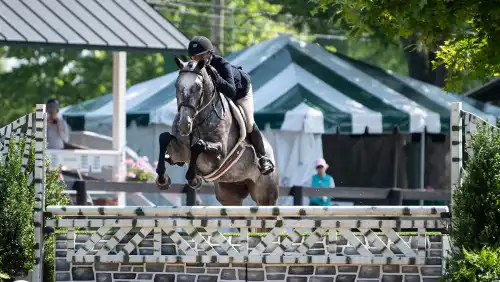As kids, we were taught that when you fall off of your horse, you pick yourself up, get back on and try again.
So when I hit the ground hard the first week of February, that’s exactly what I did. My adrenaline was pumping, so I got on and tried to push through any pain—to little avail. I had to call it a day, but I still thought, “I’ll take a little Advil tonight, and I’ll be fine tomorrow.”
The next day when I tried to ride again, I knew it was worse than what I had anticipated, so I scheduled a doctor’s appointment. X-rays soon revealed that I had broken my back at the L4 vertebra. The X-ray also showed that, unbeknownst to me, I had previously fractured a lumbar slightly higher up!
I never realized it and kept going, but looking back, I can pinpoint when it likely happened last summer. I had pushed through the pain because I had a lot going on at the time. That’s what equestrians do.
This time though, I knew I wanted to rehab properly. I’m only in my 30s, but I don’t bounce back the same way I did when I was younger. And, in hindsight, I might have done things differently when I was younger too. At one point, I broke my collarbone, but I was eager to get back in the saddle, so I began riding a bit earlier than I probably should have. Now I always have a pain in my shoulder reminding me I pushed it too fast.
ADVERTISEMENT

After breaking her back, Caitlyn Shiels focused on healing and coaching her students (including Marisa Malevitis, pictured) from the ground. Jump Media Photo
After I found out about my back, I was talking to top hunter professional Sandy Ferrell, who had previously broken her back, and her suggestion was, “Go see the best because this is your career.”
So that’s what I did. I took rehab seriously and followed the doctor’s orders to pretend I was a tree trunk. That meant no twisting or lifting, and of course, no riding. As an active person, it was extremely hard to sit down and not actively participate, but I tried my best. My team was amazing, and they really stepped up.
By late March, I was cleared to start riding again, and I was eager to get back in the show ring, but the coronavirus pandemic put that on hold. At the time, I was extremely disappointed that my return to the show ring was on hold, but now I view it as a blessing.
As a professional, it’s easy to feel like you’re getting left behind or losing ground when you’re sitting at home and not competing. In so many ways, we depend on horse showing to earn an income, to sell horses, to achieve professional goals, and to help our customers achieve their own goals. So, when you’re sidelined, it’s easy to feel like you’re missing out on opportunities and to want to rush back into it.
Because of quarantine restrictions, I was certainly not alone. We were all in the same boat, so thankfully there was no pressure—internal or external—for me to get back in the ring before my back was truly ready. I continued swimming, walking and riding at home, building my fitness levels back up and listening to my body. When we finally returned to competition in late June at the Lamplight Equestrian Center (Illinois), I felt fit, healthy and confident.
ADVERTISEMENT

Caitlyn Shiels (pictured aboard Carlisle and with True North Stables assistant trainer Cody Wooten) returned to the show ring in June after breaking her back in February. Photo Courtesy Of Caitlyn Shiels
I have a new appreciation for the value of rest and listening to my body, and I encourage other equestrians to find that same sense of appreciation.
For so many professionals, long days are the norm, and we often wear our lack of days off like a badge of honor, a testament to our commitment and drive. We get on the horse as soon as possible after injury, because we want to, because our livelihood depends on it, because it’s expected of us—or a combination of all three.
Pushing through might fulfill those factors now, but what about in the long term? If you allow yourself to get burnt out and exhausted now, will you have that same desire to ride and do what you’re currently doing in 10 years or even in five years? If you don’t allow your body to heal and recover, will you even be able to ride the same way in five or 10 years?
As competitions resume and our lives return to what many call our “new normal,” I encourage you to take a little piece of quarantine with you. Take a bit of the added rest and the extra downtime. Take the time to really enjoy riding at home and go out for a trail ride or two.
Focusing on doing these things for yourself more often may mean needing to ask for help, admitting that you can’t do it all on your own, and learning to delegate. It may mean overcoming that feeling of guilt you have when you do take a day off. None of those things are easy, but for your health, your well-being, and the longevity of your career with the horses we love, they’re well worth it.
Caitlyn Shiels is a hunter/jumper professional currently operating her own True North Stables, with bases in Illinois and Florida. Shiels is dedicated to providing individualized training that allows both horses and riders of all levels to achieve their goals.














